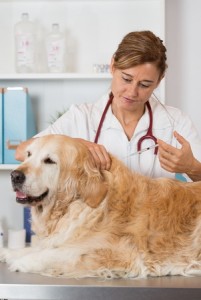 Like many of us, you may be a bit lax in keeping up with your annual physical. It’s understandable. If you’re not feeling sick, you don’t feel the need to see your doctor. Hopefully, that same attitude doesn’t carry over to your dog or cat, because although you know when you’re not feeling well, your dog or cat doesn’t—or at least doesn’t know how to tell you about it. That’s why annual wellness exams are so important—to catch something before it becomes a huge vet bill or costs your puppy or kitten its teeth, kidney function, eyesight or life.
Like many of us, you may be a bit lax in keeping up with your annual physical. It’s understandable. If you’re not feeling sick, you don’t feel the need to see your doctor. Hopefully, that same attitude doesn’t carry over to your dog or cat, because although you know when you’re not feeling well, your dog or cat doesn’t—or at least doesn’t know how to tell you about it. That’s why annual wellness exams are so important—to catch something before it becomes a huge vet bill or costs your puppy or kitten its teeth, kidney function, eyesight or life.
A yearly exam is much more than simply getting your pet’s annual vaccinations. It’s also about testing for internal or external parasites that can cause malnutrition and anemia; checking for dental disease before tooth loss sets in; trimming long toenails that can cause pain and difficulty walking; and much more.
Yearly Is a Much Bigger Time Frame for Your Pet
Experts estimate that each year of your pet’s life (depending on what stage of life he or she is in) is equal to 5 to 10 years when compared with a human’s life. That means skipping one of your pet’s annual exams is like skipping 10 years of your friend’s life. A lot can happen during that time period. For example:
- Tartar build up on your pup’s teeth can turn into periodontal disease, one of the most common (and preventable) causes of serious health issues. According to the American Veterinary Dental College, by 3 years of age, most dogs (and cats) will show signs of periodontal disease. Your veterinarian can discover the condition long before symptoms are evident and before it causes permanent damage to the teeth, mouth and even other internal organs.
- Eye conditions such as glaucoma, conjunctivitis, corneal ulceration and pannus are all treatable once they are discovered through an eye exam. If not treated, or treated early enough, these conditions can lead to vision loss and blindness.
- A small bump on your dog’s body, if not checked for malignancy, can quickly grow from barely detectable to a pronounced cancerous lump that has already metastasized to other organs.
- Diabetes mellitus is a chronic metabolic condition that can lead to long-term complications such as liver and kidney disease and eye disorders that can lead to blindness. Early detection and proper management can help prevent or delay the onset of these conditions.
Because your friend ages much faster than you do, and older dogs and cats are more prone to chronic diseases such as diabetes, kidney disease and arthritis, many veterinary experts believe yearly wellness exams are not enough. They recommend exams every 6 months for large dogs over about 7 years and small dogs and cats over 9 years. Discovering a disease early can prolong your animal’s life or at least make his or her remaining years more enjoyable for both of you.
A Partnership for Your Pet
Although you can’t fully protect your pet from disease without the knowledge and expertise of your pet’s veterinarian, neither can your pet’s veterinarian fully protect your dog or cat from disease and its effects without your cooperation. Because your furry friends can’t or won’t tell you when they hurt or don’t feel well, you have to be the eyes and ears for your pet’s doctor. Make note of any unusual behaviors or actions. Without your observations, a veterinarian must depend on physical symptoms to help diagnose a problem, and by the time they appear, you may have a much bigger problem. Also, if your feline or canine companion hasn’t seen a vet in a long time, your vet can’t directly answer questions such as: “Is your dog losing weight?” or “How fast is that lump on your cat’s side growing?” This makes your job as observer critical, but a much better option is to keep up with regular exams.
If it’s been a while since your cat or dog has seen a veterinary professional, or you have questions about unusual symptoms or behaviors, give Powell Veterinary Service a call at 970-352-9164. Together, we’ll provide the best possible preventive care and treatment for your furry friends.



WORKING HOURS:
Monday-Friday 8:00am - 5:00pm
Saturday 8:00am - 12:00 noon